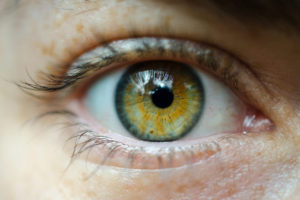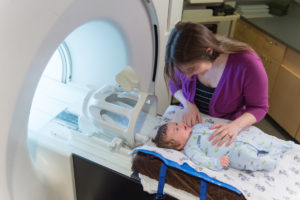For participants in the Center’s Baby Behavior and Brain Project, naptime isn’t just a break for new moms.
These daily rituals also provide researchers an important window for scientific discovery. Using cutting-edge neuroimaging techniques, they are exploring the impact of early experience on child well-being. In the brief span of a 45-minute sleep cycle, the research team observes how brain structures and connections work in a resting state.
“Babies seem like such quiet little beings, but so much is going on from a developmental perspective,” says Nicci Schmidt, manager of the project. “We know a lot about emotional development and how early emotions relate to adolescent brain development, but we know very little about the interplay between the earliest stages of brain and behavioral development.”
Schmidt and colleagues are welcoming mothers and infants participating in a five-year project, which gathers a range of data beginning during pregnancy through the second year of life. Researchers are observing infant behavior, analyzing umbilical cord blood and drawing from extensive surveys with the goal of better understanding how experience shapes the infant brain and promotes child well-being at a behavioral and cellular level.
"We know a lot about emotional development and how early emotions relate to adolescent brain development, but we know very little about the interplay between the earliest stages of brain and behavioral development."
The project, in partnership with Hill Goldsmith, the Fluno Bascom Professor and Leona Tyler Professor of Psychology, builds upon more than 25 years of joint investigation on the nature of emotional individuality to unearth links between early behavior and adolescent brain development. These results underscore the importance of early experience, but figuring out exactly how experience shapes the brain has been difficult to study until recent years with advancements in functional MRI technology.
Scientists know sensitive developmental periods such as preschool, the first formal years of schooling and adolescence are important, which is one reason why the Baby Project focuses on this earliest frame.
Overall, Schmidt says they’re very early in the research, with the first babies in the study born in fall of 2014. Each week, three to four new babies are born, quickly expanding the Center’s research family, she says. That poses many unique family schedules to work with at each testing occasion.
“The entire project is fully centered on the babies,” Schmidt says. “We ensure the testing occasions are scheduled when babies are fed, rested, and comfortable and work around the schedules of each family.”
In other studies in the future, Schmidt says the team hopes to expand the research to look at how meditation and other practices during pregnancy affect infant brain development.
– Marianne Spoon






